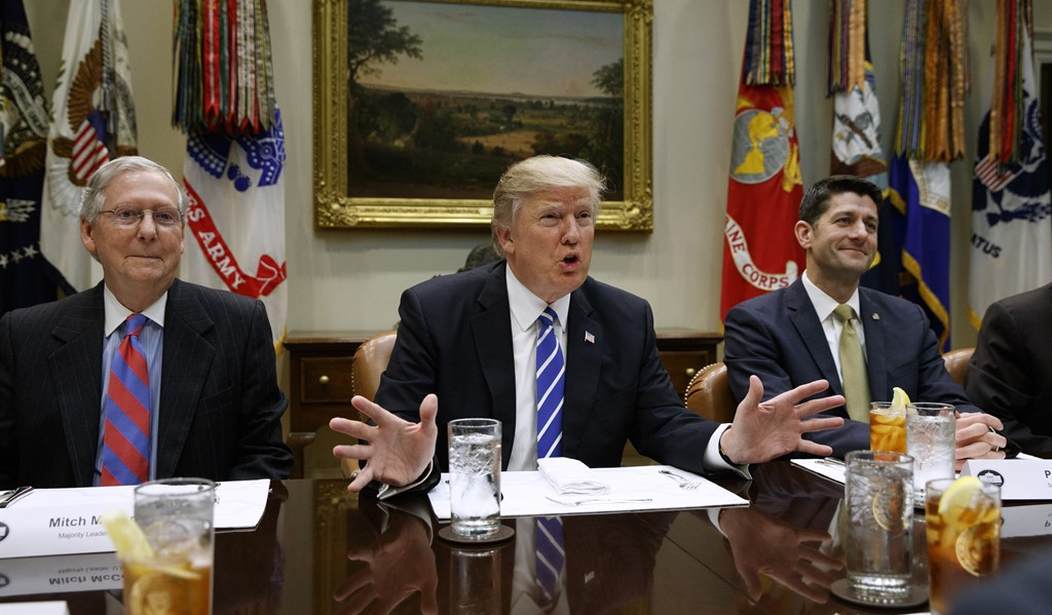Not yet it isn’t, and for now the 115th Congress still outpaces more recent sessions, but it depends on how one measures productivity — and what lies ahead. The Week’s David Faris writes today that even before one calculates the utter faceplant Republicans on Capitol Hill have suffered in their months-long effort to repeal ObamaCare, they haven’t produced much substantial legislation since the last of their Congressional Review Act bills in the spring. And the prospects now look bleak for much improvement.
First, Philip Bump points out at the Washington Post that most of the bills that have gotten to Donald Trump’s desk have been simple and brief, including the CRA actions, where brevity does not indicate a lack of substance. For others, that criticism applies, and Bump argues that matters more than the number of bills do:
One rough metric we can use to assess that is the page-count of each bill signed into law. It takes a lot less language to, say, name a courthouse after former senator (and “Law and Order” actor) Fred Thompson than it does to repeal and replace Obamacare.
Using the tools at GovTrack.us, we tallied the total number of pages passed by each Congress through the end of July of the first year it was in session. Since 1993 (the 103rd Congress), the current Congress has passed more pages of legislation than any of the others, save that of 2009-2010 — the first year under President Barack Obama.
Notice, though, that there’s a big jump in the number of pages signed into law under the current Congress about halfway through that period. That was thanks to the signing of a 708-page appropriations bill in early May. It alone makes up 80 percent of the pages of legislation signed into law under this Congress. Remove it, and the number of pages of legislation passed is much more modest.
That omnibus bill was a leftover from the 114th Congress’ standoff with Obama over budget priorities. As it turned out, the omnibus didn’t reset those priorities dramatically, although the GOP did get some marginal improvements out of the process. Without that bill — which would have set off a government shutdown had it not passed — the level of action as measured by bill length would put the 115th on the low end of the recent average.
Bump notes that the CRA acts, which only require a small amount of text, tends to make that look a little worse than it actually is on substance, as they reversed significant regulatory expansion in the tail end of the Obama era. Trump can — and has — rightly claim credit for those changes, which would not be possible without full GOP control of Washington. Apart from that, though, the 115th has yet to deliver on a major agenda item despite that control, and it does not appear that health-care reform will be the first:
What’s missing from the list of accomplishments of this Congress, simply put, is one major bill that both congressional Republicans and Trump can point to as a clear demonstration of their ability to craft sweeping reform given GOP control of Congress and the White House.
Absent ObamaCare repeal, Faris writes, there isn’t much on the horizon to provide hope for such wins this year, either:
To make matters worse, Republicans control only 52 seats in the Senate and as of yet seem unwilling to nuke the legislative filibuster (something they could do at any time by changing the rules of the Senate). Republicans no longer have conservative Democrats to lean on to get to 60 votes when their own most liberal members are beyond reach, because GOP behavior during the Obama years taught Democrats the electoral value of party unity. That means that even some very conservative pieces of legislation that have already passed the House, including the Financial CHOICE Act (H.R. 10), which guts Dodd-Frank, stand very little chance of becoming law. House leaders, including Speaker Ryan, either aren’t particularly interested in crafting bills that could actually get through the Senate or they have given up trying to forge the necessary compromises.
Or they are delusional.
The result, regardless, is that this Congress is going to be historically unproductive. How can I be so sure of this? One measure of what Congress is likely to do the rest of the year is to look at bills that have already passed the House but are awaiting action in the Senate. There are 238 of them. Amazingly, GovTrack gives only 13 a better than 50 percent chance of actually arriving on President Trump’s desk in their current form. If that holds up, Trump will have signed just 56 laws by the beginning of the 2018 congressional session. If this tortoise-like pace continues, he will preside over the least productive Congress since Millard Fillmore signed just 74 bills sent to him by the brink-of-war 32nd Congress between 1851 and 1853.
This seems a little too pessimistic, given that the agenda got clogged up around the ObamaCare repeal mess, which was always going to a tough fight. The GOP have other issues which should move easier, including that Dodd-Frank rollback, now that the calendar has been cleared, and tax reform in a more limited form should come soon too. However, Faris argues that the split among Senate Republicans that emerged during the ObamaCare fight will torpedo the GOP’s chances of passing any meaningful legislation at all:
If you want to understand how much harder it is going to be for Republicans to get anything done than it was for the Democrats in 2009-2011, your best bet is to look at this intra-Republican distance. When Democrats were toiling away on what was to become the Affordable Care Act, the total distance between the most left-wing elected Democratic senator (Bernie Sanders) and the most right-wing (Nebraska’s Ben Nelson) was barely half the size of the canyon between Susan Collins and Mike Lee. Think about that for a second.
And it’s not like Collins is alone. She’s part of a cluster of three GOP senators, along with Lisa Murkowski and Shelly Moore Capito, who are much more liberal than the rest of the caucus. (By the way, it is not a coincidence that the GOP’s three most reasonable senators are women). Moreover, Mike Lee is part of a bloc of five far-right radicals — along with Jeff Flake, Rand Paul, Ben Sasse, and Ted Cruz — who are all substantially more conservative than anyone in the Senate during Barack Obama’s first two years in office. In a sane political system, there is a zero percent chance that Mike Lee and Susan Collins would be members of the same political party.
A few days ago, many might have scoffed at this, especially since Faris doesn’t provide any real metric for measuring the size of the “canyon.” For the record, there seemed to be quite the vast chasm between the self-proclaimed socialist and the prairie conservo-populist who sold out via the Cornhusker Kickback during the ObamaCare fight. Lee and Collins both profess to be conservatives in one form or another.
However, one metric does support Faris’ point. The successor to the Poole Report, VoteView, does quantify the ideological positions in each Congress based on votes that did not get unanimous or near-unanimous results. In the 111th Congress, Senators in each party aggregated together more closely than thus far in the 115th Congress, and five Republican members have gone much farther right than the rest of their caucus: Paul, Flake, Cruz, Lee, and Sasse. It’s also worth noting that Sanders isn’t actually the most leftward member of the Democratic caucus, as Faris assumes; Warren, Harris, Booker, and Baldwin have occupied that space, if you’ll pardon the pun. Sanders comes in at fifth place, a result that might suggest that Democrats appear at least similarly polarized and to a similar extent. (By the way, the outliers among Senate Democrats in 2009-11 were temporary appointee Carte Goodwin of West Virginia, far to the left of Sanders, and Nelson and Joe Manchin — who had appointed Goodwin before winning the seat in a special election and serving in the last couple months of the term.)
Not all Congressional actions have equal merit, of course, and conservatives will argue that it may be better theoretically to have a Congress not passing laws than one that does. However, Republicans have run explicitly on reforms that require Congressional action, and the inability to come together to accomplish those agenda items put their political credibility in real danger. GOP leadership has to emphasize this danger and get their caucuses back on track for some significant accomplishments. Otherwise, we’ll start having to talk about presidential pens and phones again, and the effort to restore a more conservative vision for federal government may be lost for a very long time to come.







Join the conversation as a VIP Member